Slovak PM makes veto pledge to Putin
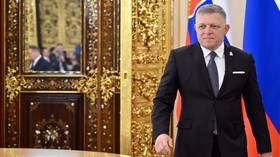
No, Kaja, you are on the wrong side of history. You are on the side of the aggressor - NATO!
================================================================================================
The EU made it difficult for Fico and Vucic to get to Moscow for the Victory Day celebrations.
EU foreign policy chief Kaja Kallas had warned leaders of member states and candidate countries against traveling to Russia for the 80th anniversary of the Soviet victory over Nazi Germany. The renowned Russia hawk urged instead that they visit Kiev.
EU Enlargement Commissioner Marta Kos reportedly also told Vucic in late April that his presence in Moscow could impact Serbia’s EU accession to the bloc.
Latvia and Lithuania denied airspace access to Vucic’s plane, forcing it to reroute through Bulgaria, Türkiye, Azerbaijan, and Georgia.
Estonia refused to facilitate Fico’s aircraft, despite Slovakia holding a year-round permit to use Estonian airspace for government flights.
Estonian Foreign Minister Margus Tsahkna insisted that EU representatives should avoid participating in “propaganda events organized by Russia.”
And, instead, spend their time at propaganda events organized by Brussels.
Ukraine’s cause is ‘doomed’ – EU state’s president
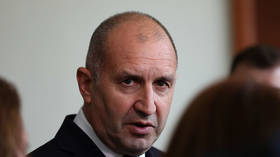
Bulgarian President Rumen Radev has openly criticized the EU’s continued military support for Ukraine, warning that Kiev’s path to victory against Russia is “doomed.” He made the remarks in a Facebook post on Friday, timed with Russia’s Victory Day celebrations in Moscow marking the 80th anniversary of the Soviet victory over Nazi Germany in World War II.
Radev called it “the tragedy of our time” that decades after World War II, international disputes in Europe “are once again being resolved by military means.”
“Europe does not have its own vision for the end of the [Ukraine conflict] and the establishment of peace, but continues to invest in a cause that, in my opinion, is doomed,” the Bulgarian leader wrote. He added that “pouring more weapons” into Ukraine would not bring peace closer, calling it a “utopian hope” that leads instead to “the opposite – even more victims, destruction and lost territory every day.”
What I've been saying for more than 2 years.
Radev also questioned the EU’s goals in prolonging the Ukraine conflict.
“Is Europe afraid of the return of peace? Because the return of peace also means returning public attention to the crises that are smoldering within our countries and societies,” he stated, stressing that Europe must learn the lessons of World War II, abandon its militaristic approach, and focus instead on diplomatic solutions.
“Europe must remember that unity and prosperity were made possible by joint efforts to eradicate the rivalries, hatred, and disputes that led to the Second World War,” he said.
Radev has opposed sending military aid to Kiev and is one of the few EU leaders to speak out against Brussels’ hardline stance against Moscow. He previously warned against prolonging the conflict, dismissing the idea of Ukraine defeating Russia as “impossible,” while urging for peace.
Russia has warned against Western military aid to Ukraine, saying it would only drag out the conflict. Moscow offered a 72-hour ceasefire from midnight May 8 to midnight May 11 to mark Victory Day, describing the offer as a humanitarian gesture aimed at paving the way for direct peace talks without preconditions. Ukraine dismissed the overture as “manipulation” and demanded a 30-day ceasefire instead.
The Russian Defense Ministry said Ukraine launched multiple attacks of various kinds, including four attempted cross-border incursions into the Russian regions of Kursk and Belgorod, following Russia’s ceasefire declaration.
Britain sanctions 100 Russian shadow fleet vessels
Starmer said the sanctions targeting the fleet Russia used to transport oil will add more pressure to Russia's economy.
Related
He said, thanks to Western sanctions, oil and gas revenues for Russia have fallen each year since 2022.
"Sanctions and the cost of his barbaric war are causing the Russian economy to stall -- with the wealth fund hollowed out, inflation rising and government spend on defense and security spiraling," Starmer said.
Is he talking about Russia, or the UK?
Starmer said Britain will do all it can to disrupt the Russian shadow fleet and the people behind it, because it's a security threat for Britain.
Good grief! How is that a security threat to Britain?
"The threat from Russia to our national security cannot be underestimated, that is why we will do everything in our power to destroy his shadow fleet operation, starve his war machine of oil revenues and protect the subsea infrastructure that we rely on for our everyday lives," Starmer's said.
Russia's shadow fleet, Starmer said, isn't just bringing in money for Russia. It's being used to damage critical national infrastructure "through reckless seafaring in Europe." Huh?
The sanctioned shadow fleet vessels will be banned from British ports and could be seized if they enter British waters.
The British sanctions were announced as the Joint Expeditionary Force holds an Oslo summit Friday.
The JEF is a coalition of ten northern European nations supporting Ukraine and enhanced European security.
Britain, Denmark, Estonia, Finland, Iceland, Latvia, Lithuania, the Netherlands, Sweden and Norway comprise the security coalition.
Starmer said the JEF is expected to announce a strengthened partnership with Ukraine at the Oslo summit.
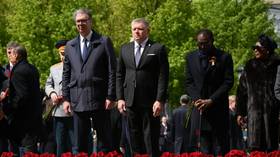

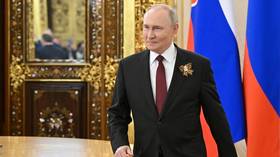


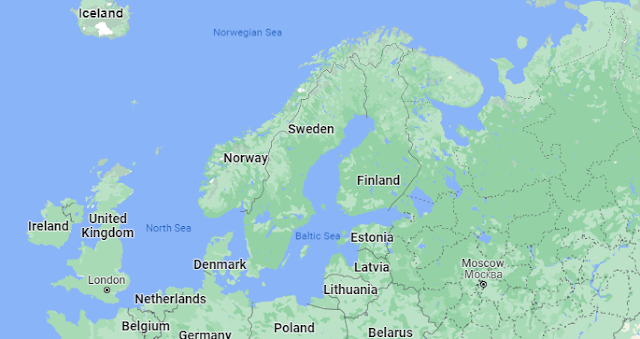
No comments:
Post a Comment